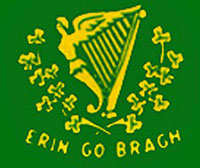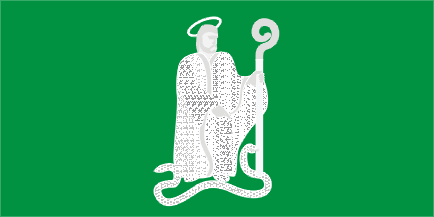Scholars have long regarded Irish immigrants in America as a wretched lot, forced by powers beyond their control to emigrate to a country where they ultimately lived in squalid conditions, surrounded by poverty and despair.
They portray the Irish immigrant as an urban dweller who could not make a niche for himself in American society until the second or third generation. This limited picture of the Irish experience in America fails to recognize that a substantial number of Irish immigrants did not remain among the squalor of New York or Boston, but suffered the hardships and reaped the fruits of the American frontier.
Overlooked as part of the Irish Diaspora in America, the West presented many opportunities to the Irish who could endure the harsh conditions of the frontier. Dispersed throughout the Midwest and Western states, these immigrants had the opportunity to make an impact on their environment, rather than be acted upon by forces beyond their control. Unlike their eastern counterparts, the Irish who settled in the West managed to grow rapidly beyond the hunger and despair of famine-ridden Ireland to shape the development of the third largest state in the Union, California.
From the first Irishman to visit the breathtaking coast of Santa Barbara in 1795, to the powerful and well-respected Irish rancheros in the San Francisco area and the Irish contractor who developed many of the first roads in San Diego, the Celtic presence is seen in many aspects of California’s development.
Those Irish men and women who opted to settle the California frontier did not, however, leave a legacy of “Irishness” as did those who struggled in the eastern cities. Instead, they embraced the existing cultures and strove for the greater good of the entire community, especially in San Diego where the need for a separate and distinct Irish community did not exist. Those who braved the trans-Atlantic journey and the cross-country trek to settle on America's West Coast did not do so in order to create an Irish community on the Pacific Ocean. They did so in order to build a better life for themselves and their progeny, as well as contribute to the development of America’s newest state.
Many Irish achievements in California, particularly southern California and San Diego, have been overlooked, however. Irish contributions to the development of “America’s Finest City” are all but ignored in San Diego history. Research shows that several of the prominent figures in Old Town and around San Diego County during the early American period hailed from the Emerald Isle. Local newspapers touted their achievements and fellow citizens recognized their names and faces as neighbors and friends, not as immigrants and outcasts, as Easterners viewed those of Celtic origin.
Perhaps the influence of the Irish settlers in Southern California during the mid-to late-1800s has been overlooked precisely because of their integration and assimilation into the communities in which they lived.
Many of the immigrants adopted so many of the local Mexican and Spanish customs that their lifestyles became indistinguishable from the “native” population. In some cases, the immigrants changed their Irish names in favor of the Spanish counterpart. Don Timoteo Murphy, a.k.a. Timothy Murphy, Juan Murray, a.k.a. John Murray, and Andrés Cassidy, a.k.a. Andrew Cassidy are just a few examples.
This reflected the willingness on the part of the Irish in Southern California to adapt to their new environment and the ability of the locals to absorb newcomers. In San Diego, the Irish immigrants became important members of the community. They integrated into the community with ease partially because of the similarities between themselves and the Mexicans. Both were newly admitted to the United States, and both understood the trial of being an outcast in one's own land.
The Mexicanos and the Irish shared a similar culture, rich in music, family life and religion. The latter similarity was crucial at a time when most Americans, particularly on the East Coast, embraced Anglo-Protestant customs. This sect of society viewed Catholics, notably the Irish Catholics, with suspicion and disdain. In southern California, however, Catholics comprised a majority of the population.
The Irish immigrants who found a place in San Diego’s community remain, for the most part, nameless in an otherwise colorful history. With the modern development of San Diego, their homes and achievements lay buried in a past dominated by Spanish and Mexican history. Even a cursory glance through a census record reveals, however, that the Irish did survive the tortuous cross-country trek, and arduous trip around the horn of South America to prosper in San Diego.
Irish surnames appear in property, tax and marriage records as evidence that they lived a full life, unaffected by the anti-Irish sentiment elsewhere in the United States. Several held important community posts, and one, James McCoy, served as a California State Senator in Sacramento during the 1870s.
The Irish who settled in San Diego played a major role in the small town’s development from a sleepy frontier port to a major American city. The San Diegan Irish managed to escape the pitfalls of poverty and discrimination found on the East Coast and prospered among the locals, who remained receptive to the Celtic newcomers.


 3Víctor
3Víctor LinkBack URL
LinkBack URL About LinkBacks
About LinkBacks



 just kidding ya...
just kidding ya...  My interest in Catholicism is sort of twofold: from an academic standpoint and as a possible, but not guaranteed, replacement for my lapsed Protestant beliefs. As I said, my encounters with Catholicism in the U.S.A. have left me more or less feeling underwhelmed. Expecting, say, Tridentine Mass and whanot, only to find a service little different, but more showy, than a typical Protestant service-- Kind of made me guess again, but I'm not exactly going to say that this turns me off of Catholicism completely.
My interest in Catholicism is sort of twofold: from an academic standpoint and as a possible, but not guaranteed, replacement for my lapsed Protestant beliefs. As I said, my encounters with Catholicism in the U.S.A. have left me more or less feeling underwhelmed. Expecting, say, Tridentine Mass and whanot, only to find a service little different, but more showy, than a typical Protestant service-- Kind of made me guess again, but I'm not exactly going to say that this turns me off of Catholicism completely.
 Citar
Citar













Marcadores